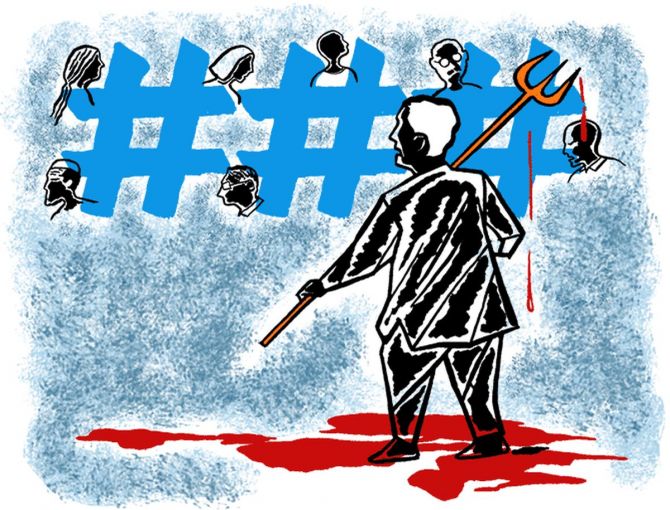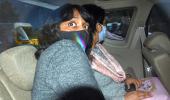'During the Emergency, it boiled down to two people: Mrs Gandhi and her younger son.'
'But today, the cancer is spreading all over.'

Four years ago, in June 2017, disturbed by events in the country, a group of retired bureaucrats formed a group and wrote an open letter to Prime Minister Narendra Damodardas Modi expressing their concern.
They have written many letters since.
A recent letter spoke about how pained they were about the way the government handled the COVID-19 second wave. This was followed by a letter on the 'disturbing developments' in Lakshadweep.
One of the signatories of the letter was the 1964 batch Indian Foreign Service officer, Deb Mukharji who served as India's ambassador and high commissioner to Nigeria, Bangladesh and Nepal.
"The Emergency was about holding onto power and perhaps a misplaced idea of governance - making trains run on time. What is happening today is a massive project to change India itself, from a multi-cultural mosaic to a uniform colour wash," Ambassador Mukharji tells Rediff.com's Shobha Warrier in the concluding segment of the interview.
Wise words on the 46th anniversary of the First Suspension of Democracy, the Emergency.
Another issue which you people highlighted in one of your letters is, freedom of expression.
Today, if you criticise the government or its policies, you become anti-national.
Dissenting voices are muffled. Many people compare this situation to that of the Emergency.
Have we reached that stage?
Actually, we are in a much, much worse stage today.
I was in Delhi as a government officer during the Emergency.
What was happening then was deplorable, but we all knew that it was going to end as soon as the elections were held.
When we discussed the situation among ourselves, we knew there was an end to this.
What is happening today is far more dangerous.
The divisive policies of the government, we versus them, is creating a group of people with deep commitment and support to the idea of uniformity.
Whether it is institutions, whether it is people, families or friends, we are dividing ourselves right down the line.
This is a much more dangerous situation where we are being brainwashed into believing in an India with a uniform colour code, with all rights and privileges to one community and the others discarded.
This is the game that is being played out now.
The game with regard to the Citizens Amendment Act, NRC and NPR.
The game of savarna versus the dalits is yet to be put on the table.
The fear that has been instilled in the minds of people today is unprecedented. It is very disturbing.
Look at the media. With a few exceptions there is no honest reportage. And any show of independence carries a price tag, as many journalists are finding out.
But these details pale before the basic difference between the Emergency and today.
The Emergency was about holding onto power and perhaps a misplaced idea of governance - making trains run on time.
What is happening today is massive project to change India itself, from a multi-cultural mosaic to a uniform colour wash.
You worked with many governments from 1964. Have you seen or experienced a situation like this in the history of independent India?
Never. All past governments have tried in their own way to promote welfare of the people.
The primary focus of this government is the promotion of their ideology.
A professor I interviewed told me that it is easy to dislodge an authoritarian individual like during the Emergency, but when the system becomes authoritarian, it is very difficult to dislodge the system.
Do you think so?
He is quite right. During the Emergency, it boiled down to two people: Mrs Gandhi and her younger son. But today, the cancer is spreading all over.
Way back in 2017, your group of retired civil servants and bureaucrats had written an open letter on the growing authoritarianism, majoritarianism and not allowing debates and discussions in India.
Has the situation become worse in 2021?
When we formed the group in June 2017, exactly four years ago, there was a feeling of claustrophobia and fear on what was happening around us.
We wanted to come out of that. At that time, many people told us that we would be in trouble.
But our conscience told us that we must speak up.
I like to think that more people are becoming conscious of how the nation is being hijacked and are speaking up despite the difficulties.
On the other hand, the arms of the State are being ruthlessly used to quell any kind of opposition or different way of thinking.
The Bhima Koregaon accusations are a case in point.
Many independent NGOs and journalists have had to pay a price for standing by their principles.
Certainly, in terms of spreading the ideology, things are worse.
You have written many open letters on various issues to the PM. Has there been any response?
Directly, no. But lately from the kind of reactions we are getting, what we say seems to be causing some concern
Reactions from?
From the government. There were no reactions to our letters for very long. But now, there seems to be some reaction.
Not positive, but reaction nevertheless. Some trolls are favouring us with their attention.
Is the reaction in the form of an introspection on their part or aggression?
Aggression, of course.
For example, the over the top reaction of a minister who lashed out at a letter written one year ago (without addressing the substance of the letter).
It also means they are taking notice.
On the other hand, some of the suggestions made in our letter on Covid, such as free universal vaccination and providing food to the poor have been reflected in the prime minister's latest speech.
Of course, this may be pure coincidence, for others have made similar suggestions.
How do you think history will judge the present government and Narendra Modi as prime minister?
I personally think that the agenda of one country, one people, one party cannot work in India as India is too diverse.
Most of our linguistic states have strong cultural moorings.
Crass handling of these has not brought any joy to the BJP, either in Bengal or in Kerala.
The problem is, they are dividing people down the line, and that can cause very serious consequences in future.
When we became independent in 1947, it was still work in progress.
Our civilisation may have been ancient, but our nationhood required careful nurturing. Unfortunately, we took things for granted.
When you strike at the roots of unity by your divisive politics, it can have grave consequences.
I cannot say what those consequences will be. But I am deeply concerned about how gravely they may affect our future.
So, how history will judge this government and its leader, will depend on how the effects of divisive politics on India will be.
If successful, a different hard India, unrecognisable from the present, will emerge.
If not, history will judge the government and its leader responsible for the end of the dream that was India.
Unless, of course, the real India reasserts itself.
Feature Presentation: Aslam Hunani/Rediff.com










